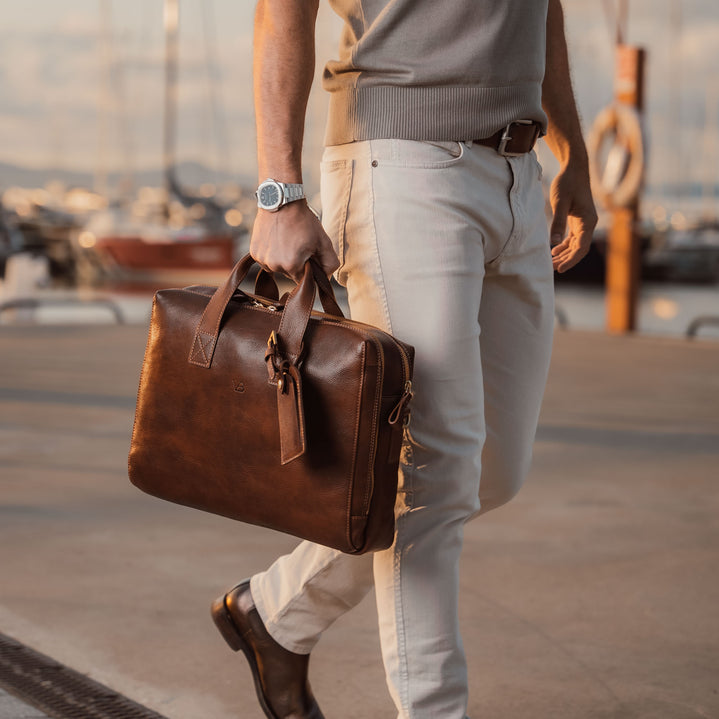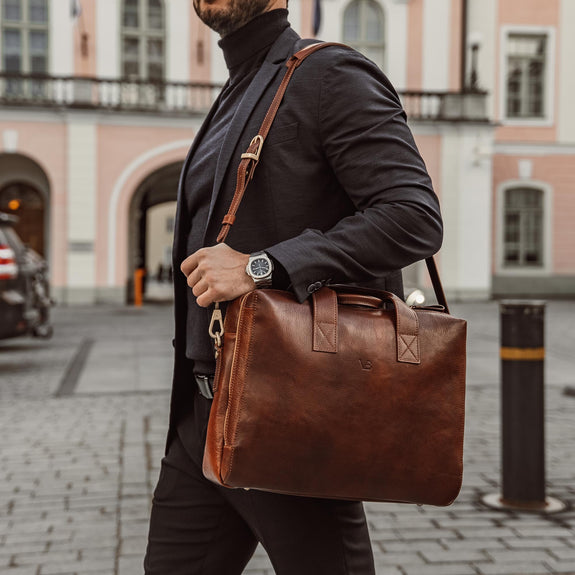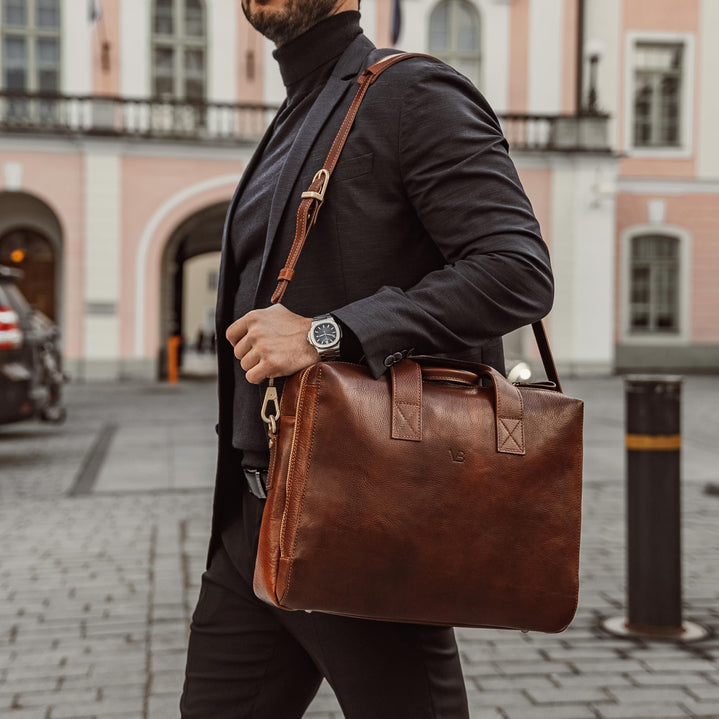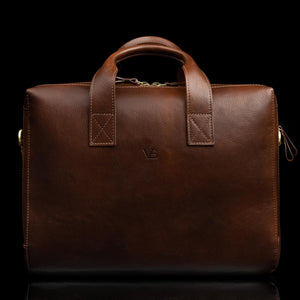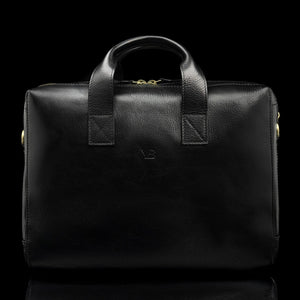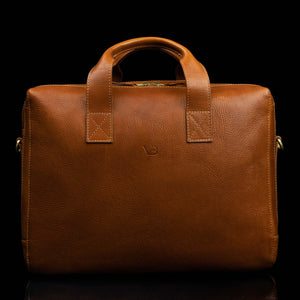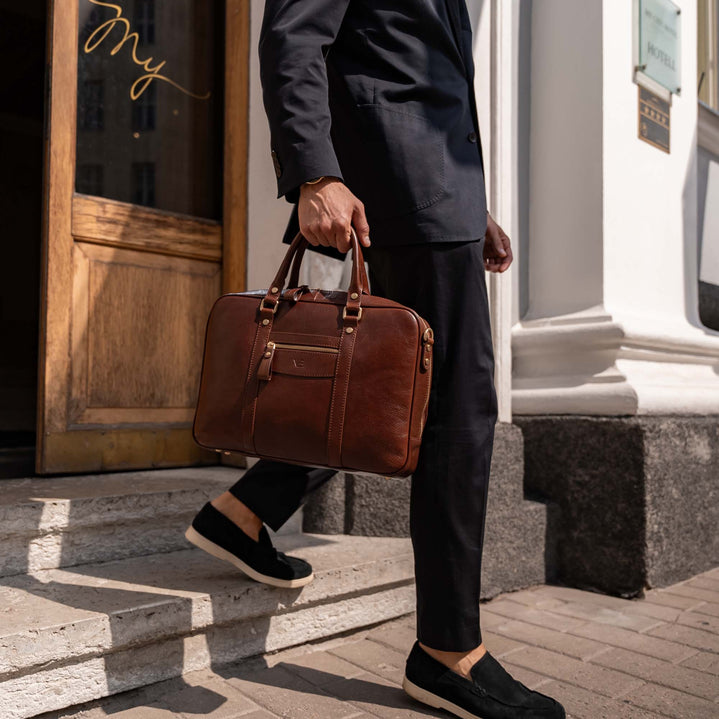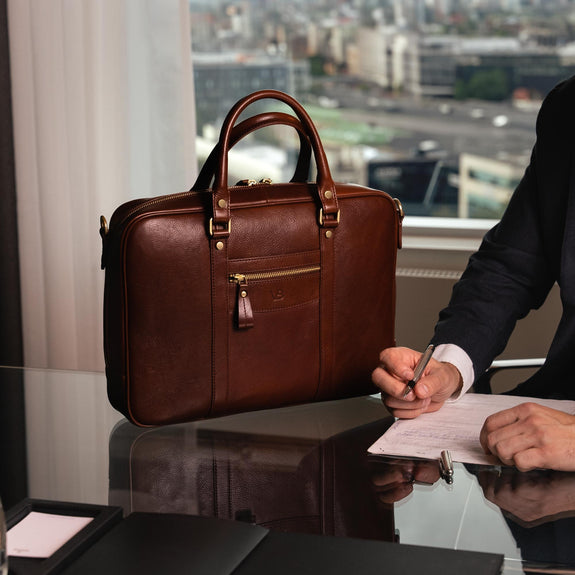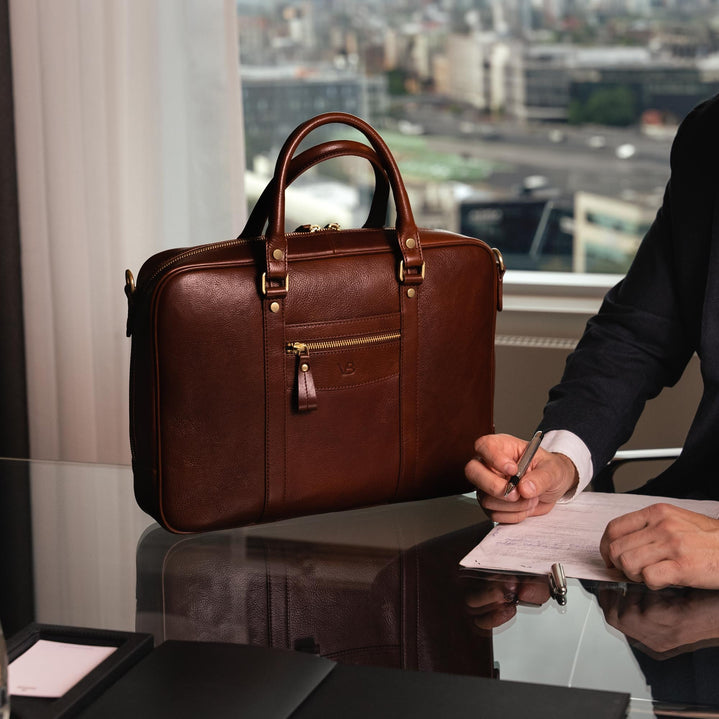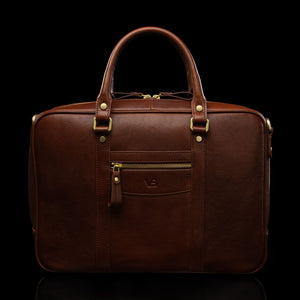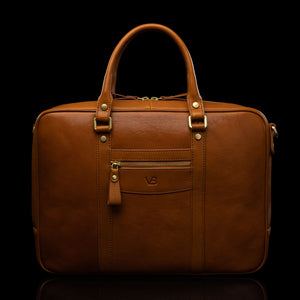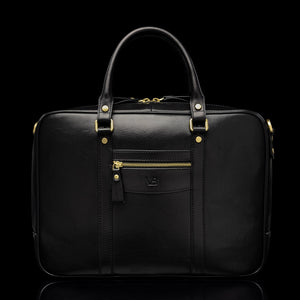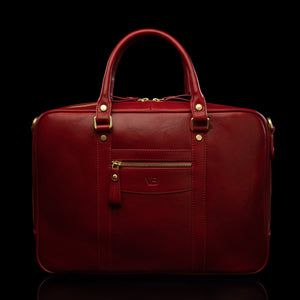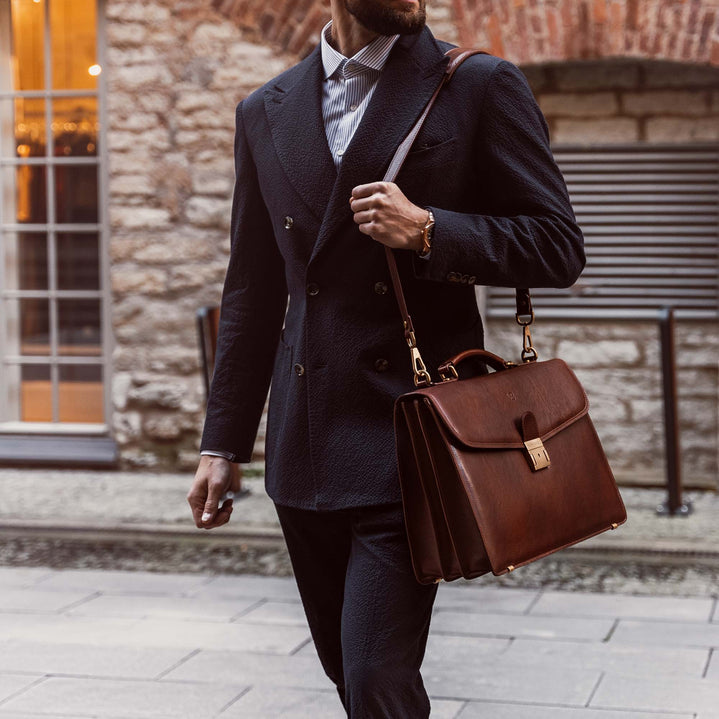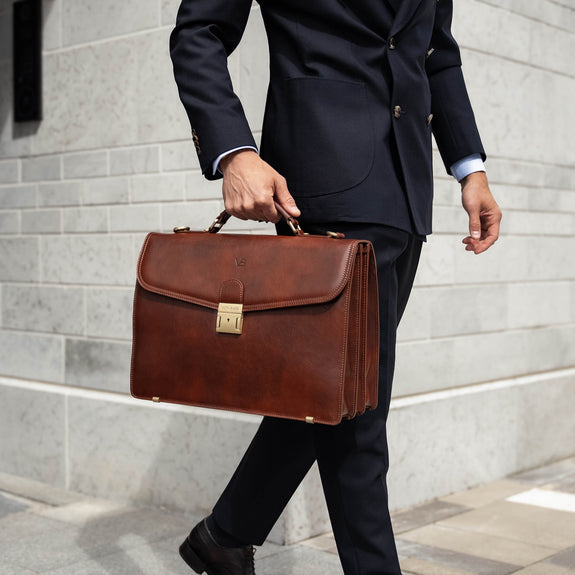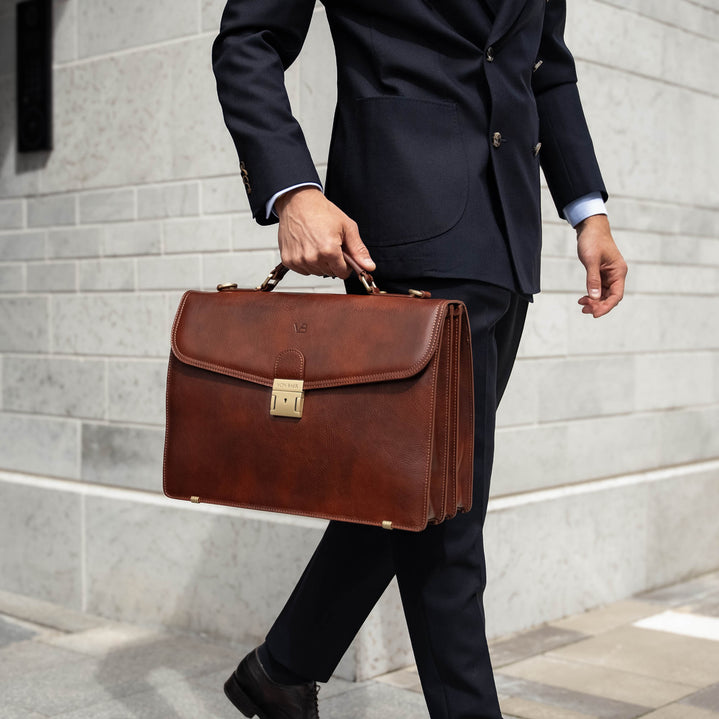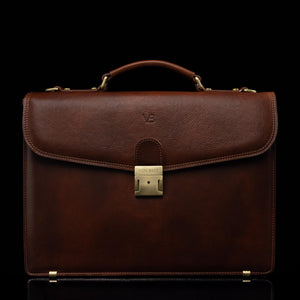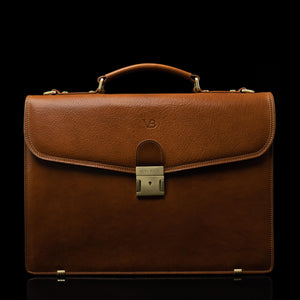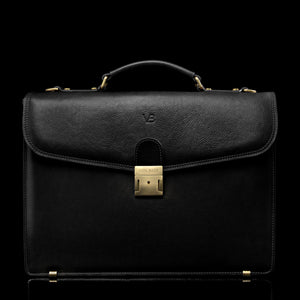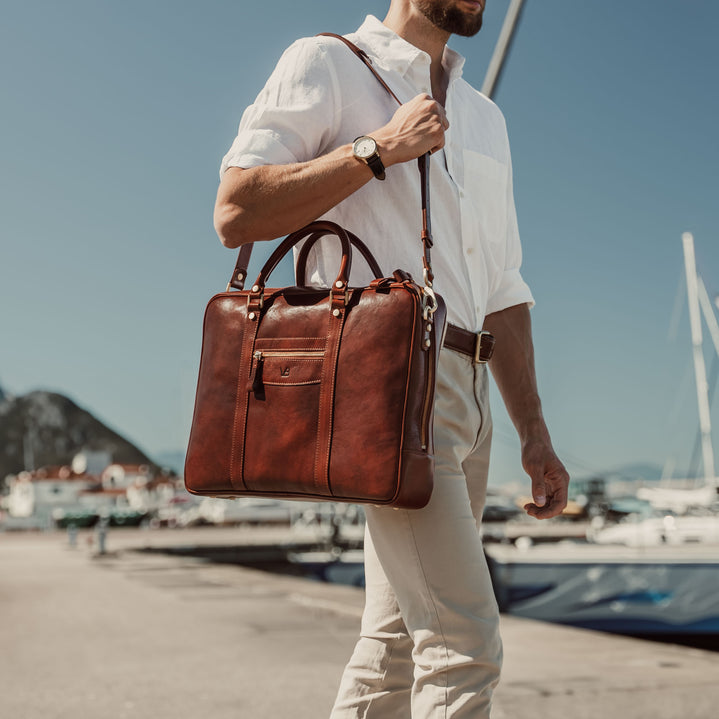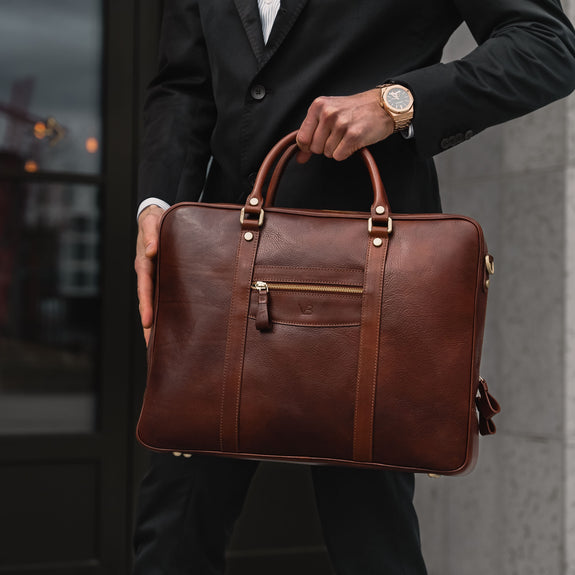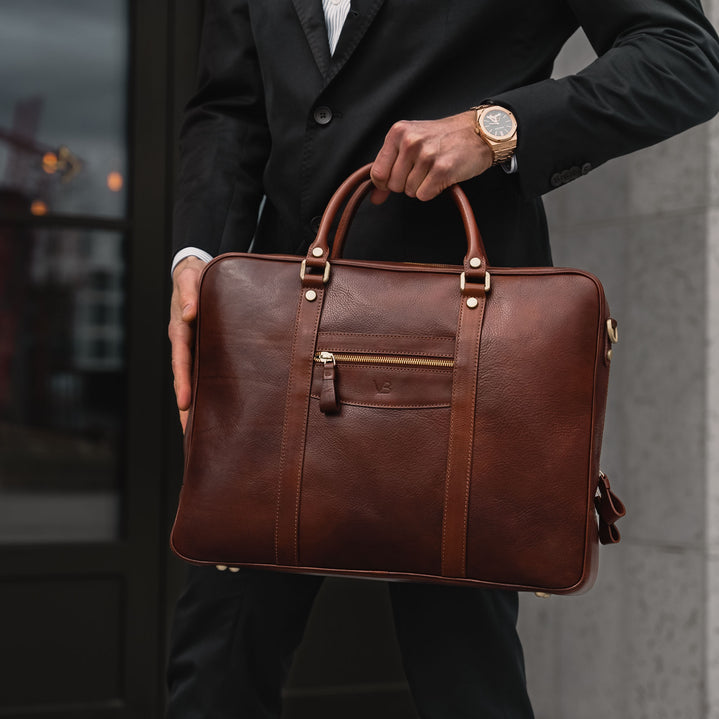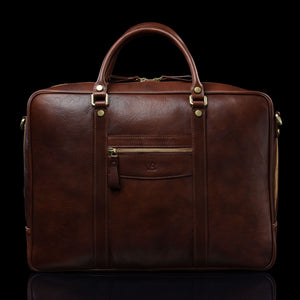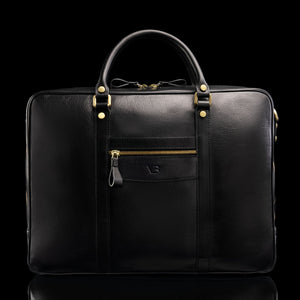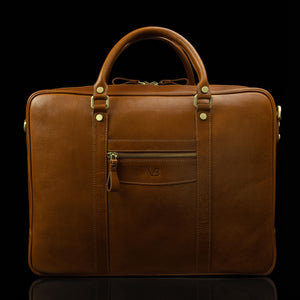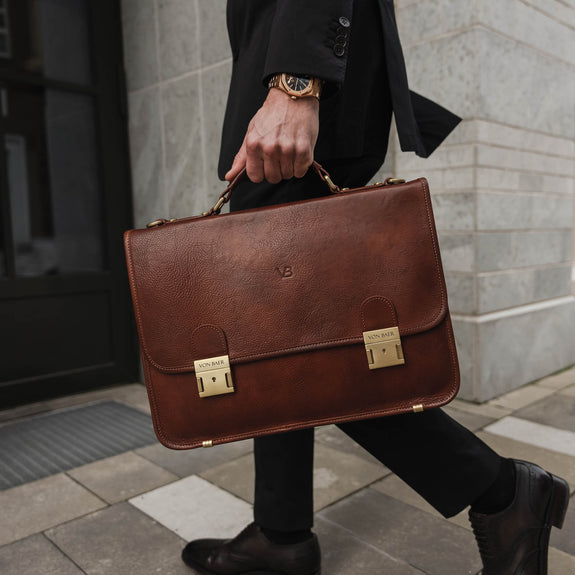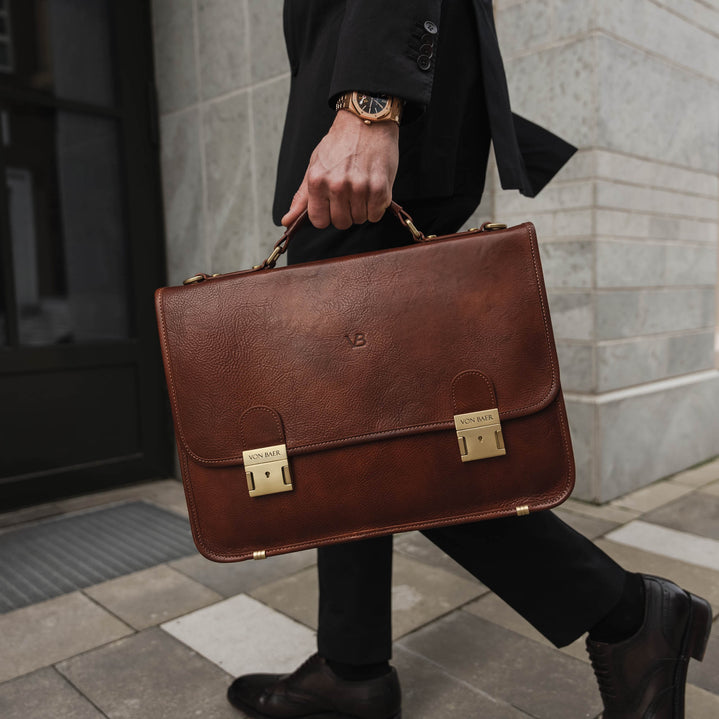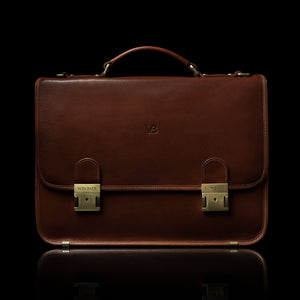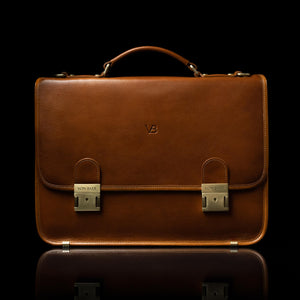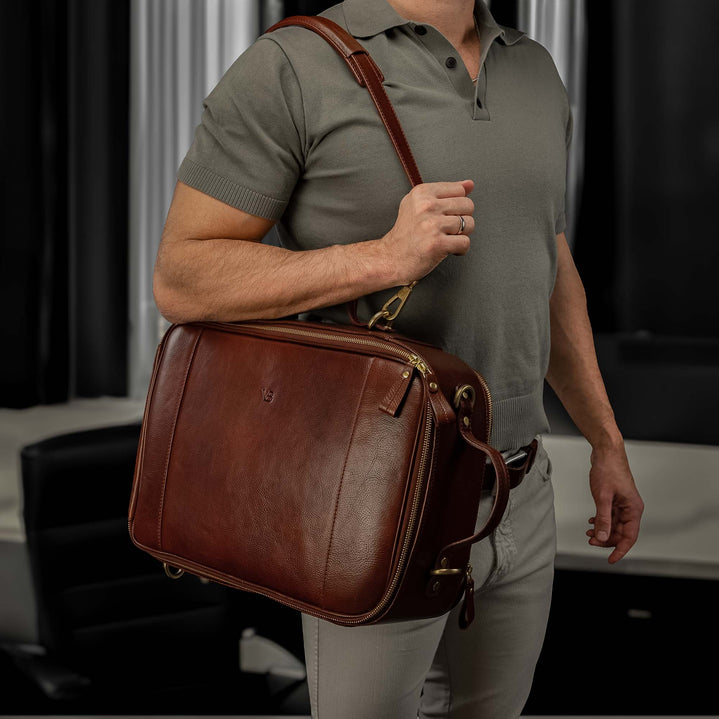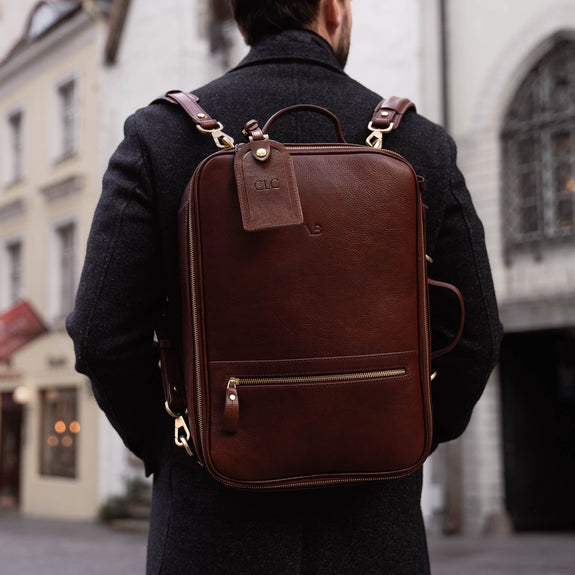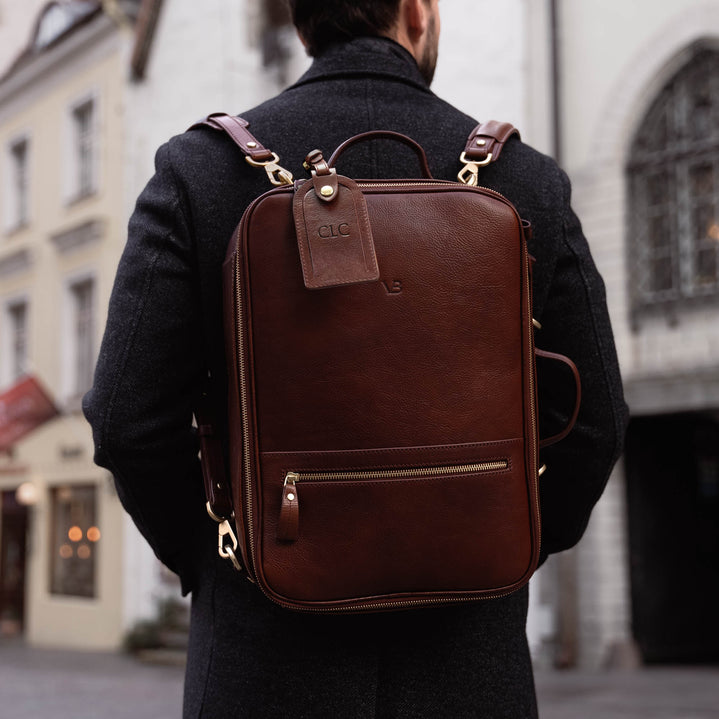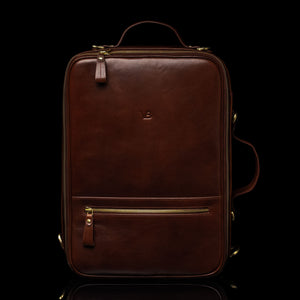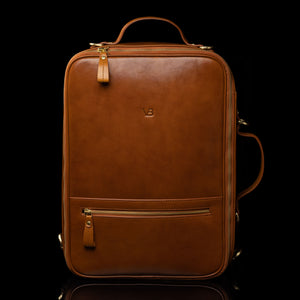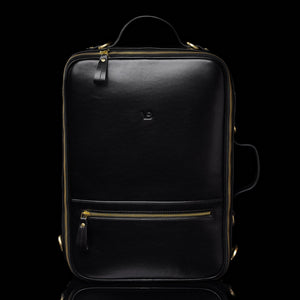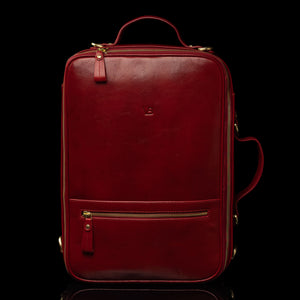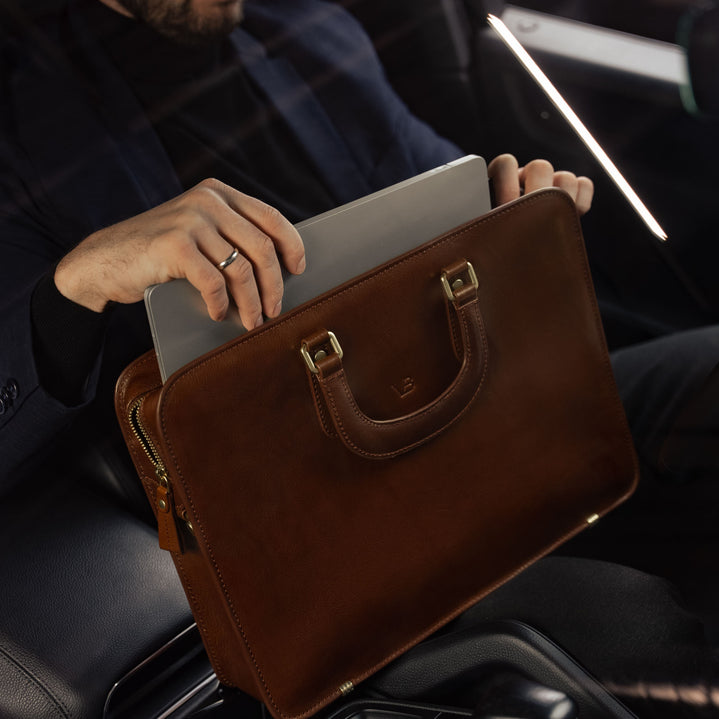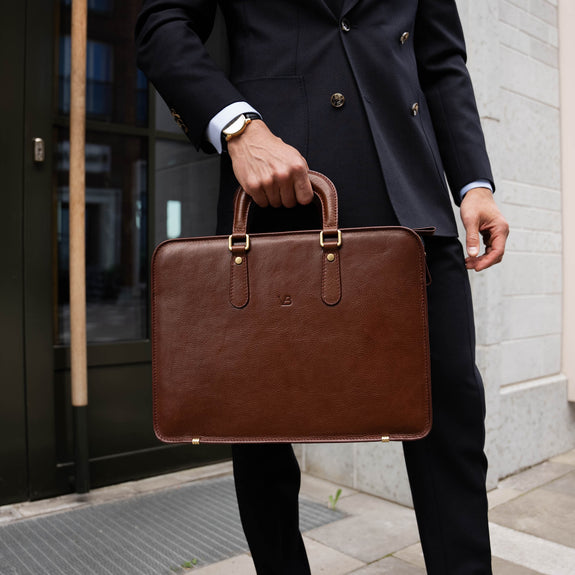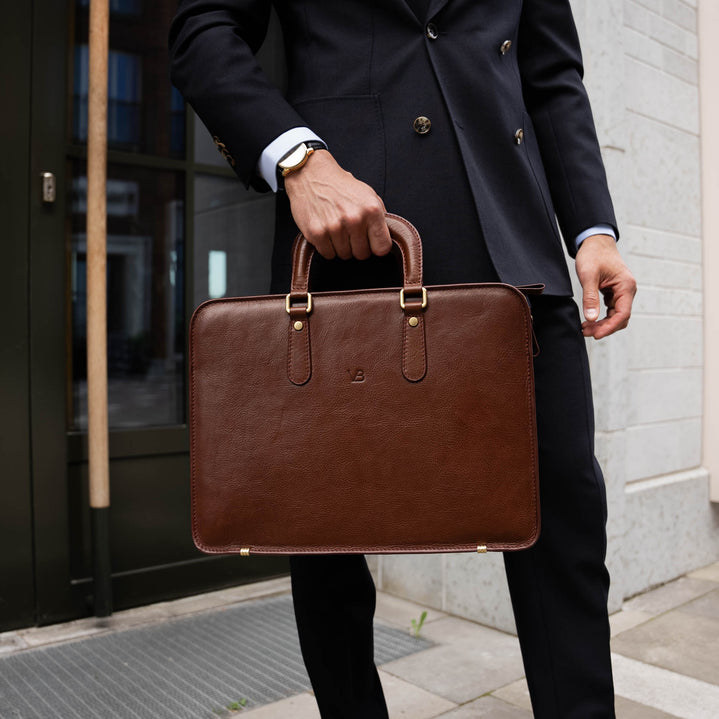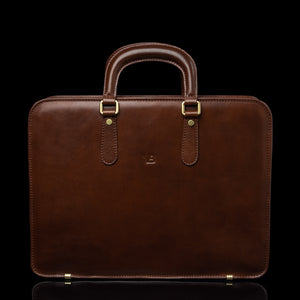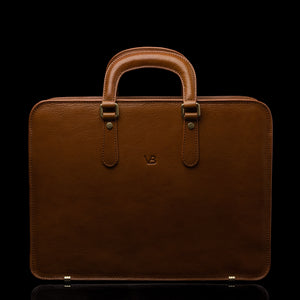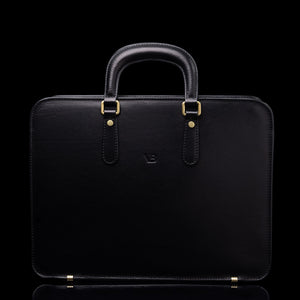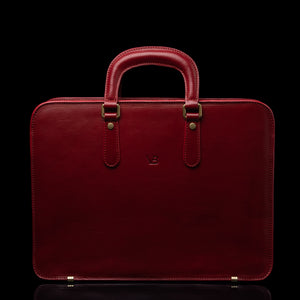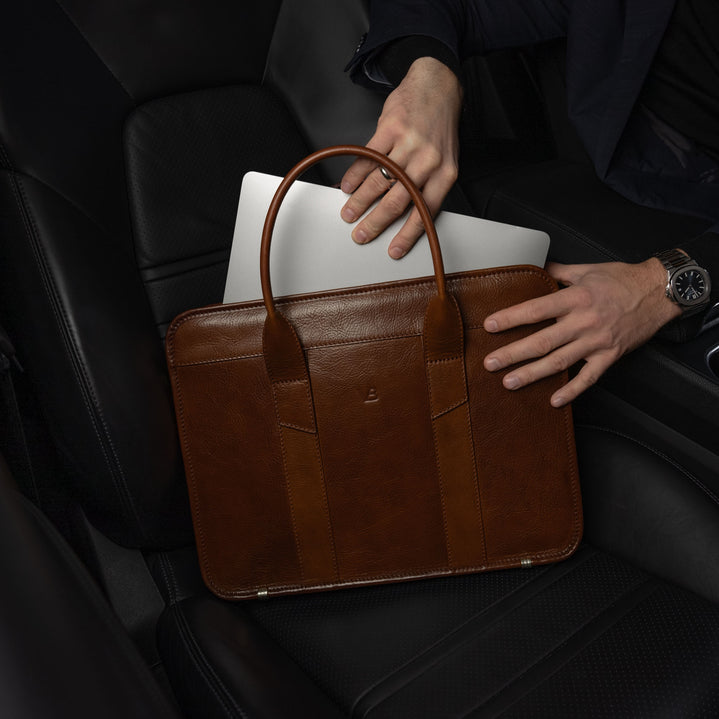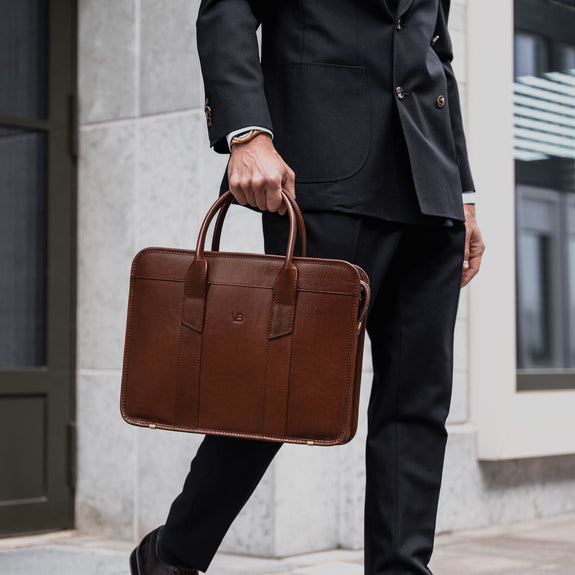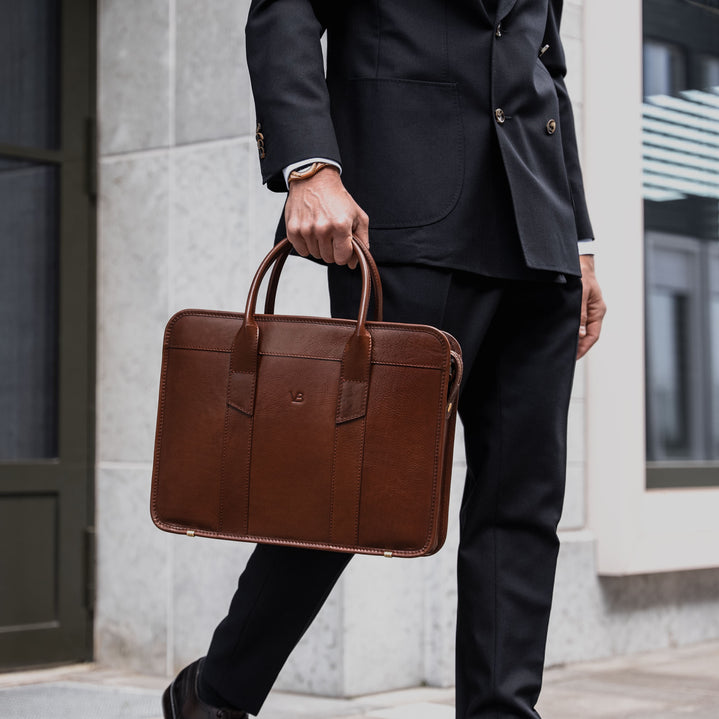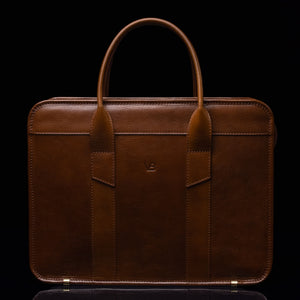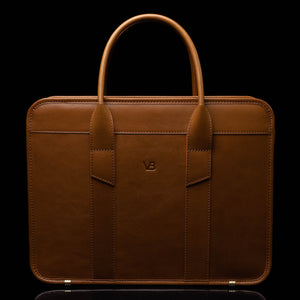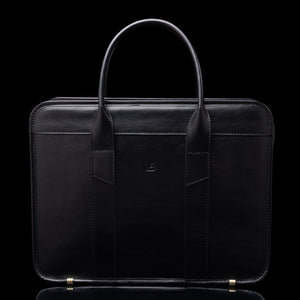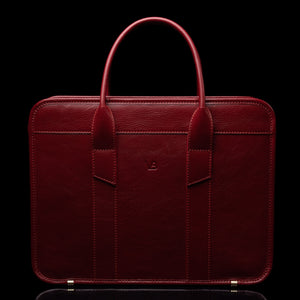Leather Laptop Messenger Bags for Men
Luxurious laptop messenger bags, perfect for a smart commuting bag.
Detachable and adjustable shoulder strap included.
Handmade from the finest full-grain vegetable-tanned Italian leather.
Essential
Modern Briefcase
$1,500
City
Leather Laptop Bag
$1,500
No.1
Men's Leather Briefcase
$1,800
City Large
Leather Laptop Bag
$1,600
No.2
Leather Messenger Briefcase
$1,600
10X
Leather Laptop Travel Bag
$1,700
Elegant
Slim Leather Laptop Bag
$1,400
Exquisite
Slim Leather Laptop Briefcase
$1,500
AS FEATURED IN


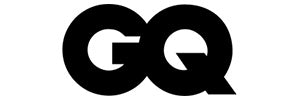

Why Choose Von Baer?

Expertly Handcrafted Leather Products

Full-Grain Vegetable-Tanned Italian Leather

Strong Hardware for a Lifetime of Use

Luxurious & Durable Cotton Lining

Personalize With Embossed Initials

Exquisitely Rich-Hued Leather for Refined Tastes
Buyer's Guide
How does the leather quality (e.g., full-grain vs. top-grain) affect durability and the bag’s ability to age with prestige?

You’ve probably noticed that some bags look sharp the day they’re bought... then start to crumble faster than a cheap paperback spine from the discount store. Why you ask? It's because cheap materials and bags made without care will not last as long. Here's how to choose one that lasts:
Full-grain vegetable-tanned leather is the equivalent of original hardcover print - thick, uncompromised, designed to hold up over decades. It retains the tightest fiber layer of the hide, which acts like natural Kevlar. Run your hand across it and you’ll feel micro-variations - almost like the topography of a landscape map - that no factory spray finish can fake. Over years, those fibers compress and polish themselves instead of breaking. That’s why you see old executive briefcases in The Wall Street Journal profiles: deep, glossy patinas that practically tell their owner’s biography.
Top-grain leather? It’s the airbrushed headshot. The surface is sanded down for smoothness, pigments sprayed for uniformity. It looks perfect on day one, sure. But once the sanding removes that top protective layer, scratches dig in deeper, and edges fatigue earlier. Imagine spending money on something marketed as luxury only to discover it wasn’t built to last - frustrating and expensive.
Here at Von Baer, we always recommend full-grain vegetable-tanned leather, particularly for professionals in respected positions.
Practical tip: Push your thumb gently into the leather. Full-grain “blushes,” showing lighter oils before recovering, almost like healthy skin reacting. Top-grain stays rigid. Smell also matters - full-grain with vegetable tanning carries a rich, earthy aroma. If it smells faintly synthetic, odds are pigments and coatings dominate.
Numbers worth knowing:
-
Full-grain thickness in high-end messengers runs 1.8mm-2.2mm. That’s dense enough to resist tearing and stretching.
-
Top-grain averages 1.4mm-1.6mm - thinner, more vulnerable under daily stress.
-
Properly conditioned full-grain can last 15-20 years; top-grain bags usually start breaking down around year 3-5.
-
Full-grain: heavier (average 4.5-5.5 lbs), pricier ($800-$2,000), but heirloom-level prestige.
-
Top-grain: lighter (3.5-4.5 lbs), mid-tier pricing ($250-$700), but a shorter lifespan.
Isn’t it ironic that the “perfect-looking” leather often fails first? Takeaway: If you want your bag to age like a Von Baer piece designed for a lifetime, rather than a short-lived accessory, full-grain is the choice.
You can learn more about leather types here.
Once you’ve made peace with that, proportions and silhouette become the next filter.
Which messenger designs balance a slim, stylish profile with the ability to securely fit my laptop and business essentials?

Here’s the catch: everyone loves the sleek outline of a slim messenger - until they try to jam in a laptop charger and the zipper groans louder than an overworked gate agent on a Monday morning (or worse, breaks off entirely!). This is way beyond the bag aesthetics. It’s about well designed gusset depth (the bag’s side thickness) and internal architecture (how space is divided).
Here's what we recommend:
-
Gusset depth ranges from 2.5 inches (minimalist) to 5 inches (capacity-focused).
-
Internal layout determines if that space feels like a New York studio apartment or a well-designed SoHo loft.
The best luxury designs trick the eye: appearing lean outside, unfolding like origami inside. Precision cutting keeps bulges at bay. Budget models stuff in padding or chunky zippers, leaving you with what feels like a padded lunchbox.
Real-world scenario: You’re walking into a pitch meeting. You’re carrying a 15-inch MacBook (14.1” x 9.7” x 0.7”), notepad, slim folder, charger (5.5” x 1.7”), phone, wallet. A 3-inch gusset with three compartments nails it. Anything slimmer? You’re cramming. Anything fatter (5-inch expandable gusset)? You’ve crossed into satchel territory, bulkier against a tailored suit.
Practical tip: Add 0.5-1 inch clearance beyond your laptop’s footprint. That wiggle room stopps the zipper strain and warped corners. For documents, demand a 9” x 12” flat pocket - nothing undermines credibility like presenting rumpled paperwork.
You can learn more about messenger bag types here.
It’s a balancing act, like packing for a weeklong trip with only carry-on: discipline vs. indulgence. Takeaway: Once size matches lifestyle, construction is the real stress test. Will the silhouette actually survive years of load-bearing?
Does this leather bag offer the craftsmanship and reinforcement (stitching, hardware, straps) to last for years of daily professional use?

Durability hides in the invisible. Most buyers won’t peek at stitching angles or rivet choices - but they should. Think of it like a skyscraper: the exterior wows, but if the foundation is compromised, collapse is inevitable.
-
Stitching: Saddle-stitching (two needles crossing in each hole) is the gold standard. It won’t unravel even if one thread snaps. Machine lock-stitch is faster, but a broken thread can unzip an entire seam under pressure.
-
Thread: Bonded nylon or polyester thread at Tex 90-135 weight withstands years of strain. Cotton? It rots with moisture.
-
Hardware: Solid brass or stainless buckles handle 200 lbs pull force. Alloy buckles shear under 100 lbs, which is essentially a laptop plus a couple of books.
-
Straps: Proper ones layer two pieces of 2mm bridle leather around a nylon reinforcement core, stitched and riveted. Cheaper models rely on a single rivet - the equivalent of holding up a suspension bridge with duct tape.
Practical tip: Flip straps. Quality ones are lined on both sides with leather, edges burnished and waxed at 1.5mm radius. Unfinished suede undersides fray, soak sweat, and weaken.
Daily carry weight is no joke: 6-12 lbs average, spiking to 30-40 lbs capacity tolerance in well-built designs. Anything less? Expect failures by year two - often mid-commute, coffee in hand, strap in pieces.
What features make this bag functional for travel while still maintaining a sophisticated, luxury aesthetic?

Travel is where “good-looking” bags are exposed. Suddenly it’s not about how a messenger looks in a mirror selfie - it’s how it handles the TSA line, a crowded boarding gate, and a rainstorm on arrival.
Key features worth dissecting:
-
Luggage pass-through: Proper ones measure 7-9 inches wide. In Von Baer bags, the leather strap is thoughtfully integrated into the design, whereas other mid-tier brands bolt on a nylon strap - practical but aesthetically lazy.
-
Laptop access: TSA-friendly designs open 180 degrees flat. Look for 0.25-0.5-inch padding, lined with microfiber to protect finishes. Anything thinner is cosmetic.
-
Weather protection: Untreated leather absorbs water at 1ml per cm² in 30 seconds. Semi-aniline or wax treatments cut absorption by 90% or more. Zippers should overlap at least 0.5 inches to block seepage.
Practical tip: Strap width is critical. 1.25-inch straps cut into shoulders over long walks. 1.5-2 inches padded with memory foam spread weight comfortably. Watch base weight too: under 5 lbs empty keeps the load reasonable after you pack it.
Think of airports: you’re juggling IDs, phones, coffee. Do you want a bag that slides seamlessly over a carry-on handle, or one that flops sideways every few steps? Luxury gets it right by making function invisible - discreet pass-throughs, hidden flaps. Mid-tier? It screams utility with dangling straps.
How does the specific finish and leather treatment (polished, matte, patina-ready) project refinement in different business and lifestyle settings?

Leather finish is more than shine - it’s the bag’s vocabulary. Every finish speaks differently in a room.
-
Polished (high-gloss): Achieved with corrected grain or heavy finishing. Reflective under office lighting, scratch visibility <0.2mm. Ideal for finance, law, high-stakes boardrooms. Downside? Repairs require professional refinishing.
-
Matte (semi-aniline or nubuck): Minimal finishing gives a soft glow. Scratch depth tolerance 0.3-0.5mm, meaning marks blend instead of jarring. Perfect for consultants, creatives, or client-facing industries where warmth matters.
-
Patina-ready (vegetable-tanned): Starts stiff (Shore D hardness 50-60), darkens with oils and sunlight. Conditioning needed every 6-12 months. Over years, it becomes distinctly yours - like those leather armchairs in Architectural Digest spreads.
Practical tip: Drip a bead of water. If it absorbs in <10 seconds, untreated. Beads for 30-45 seconds? Protected. Love patina? Leave it untreated. Want consistency? Go semi-aniline.
Here’s the kicker: patina looks better over time if you embrace marks as storytelling. But if uniformity is your thing, you’ll find those marks stressful, not charming. Takeaway: Finish decides the language your bag speaks. Once chosen, the last decision isn’t visual - it’s emotional payoff.
What distinguishes this luxury messenger bag from mid-tier alternatives in terms of emotional payoff - the feeling of success, refinement, and prestige?

Here’s the moment of truth. Mid-tier bags work - they’ll carry your laptop, maybe even look decent for two or three years. But luxury isn’t about mere function; it’s about whether your tools reinforce or undermine your presence.
-
Tactile: A full-grain messenger weighs 4.5-5.5 lbs empty. Solid brass buckles tested to 200 lbs tension close with a satisfying click. Vegetable-tanned leather smells unmistakably organic. These sensory cues tell your brain: this tool belongs to your station.
-
Confidence: Walk into a client meeting. Everything else communicates credibility - watch, suit, shoes. Then a sagging synthetic bag on your shoulder tells another story entirely. Why sabotage yourself?
-
Longevity: A properly maintained full-grain bag lasts 15-20 years. Mid-tier bags wear out in 2-4 years. Replacing them multiple times not only costs more in aggregate but dilutes emotional continuity.
Practical tip: Warranties reveal intent. A luxury brand offering 10 years to lifetime repairs builds for legacy. A one-year policy signals disposable design. Ask yourself: do you want to buy three replacements in a decade or one enduring piece?
Still unsure? We compare the best luxury laptop bags in this guide.
How Is Von Baer Leather Different?
Not all leather is the same.
Since 2015, we at Von Baer have dedicated ourselves to high-quality real leather.
Here's a 30-second summary of how to choose a better leather product:
- Leather comes in different grades: full-grain, top-grain, and split/bonded - which represent how much of the original product is used (less product used = cheaper).
- Full-grain is the best grade of leather you can buy: exceptionally durable, developing an elegant patina, and having that beautiful real leather smell.
- Cheaper grades are less durable, age poorly, and don't have that authentic scent.
- Leather is processed through "tanning", which makes it durable and water-resistant.
- The two main methods for this are "vegetable-tanning" and "chrome-tanning".
- Chrome tanning uses harsh chemicals that are bad for the environment and produce a worse quality leather.
- Vegetable tanning is the best method, being more eco-friendly, and producing leather with a better patina and scent.
That's why here at Von Baer, we only use full-grain vegetable-tanned Italian leather, sourced from the finest tanneries across Tuscany, Italy.
It ages beautifully over time, developing a unique patina, making it more durable and luxurious than lower-quality leather.
It's also why we developed the leather standards trademark Cuoio Superiore (meaning "superior leather" in Italian).
Learn more about Von Baer here.

